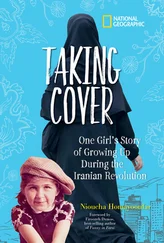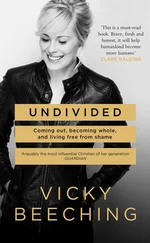As traumatic as the moving around and evading authorities might seem, it only made my mother’s faith more entrenched. She firmly believed in the traditions of plural marriage and the teachings of the church, and her positive experience growing up shaped every part of her outlook. Whenever she spoke of her childhood, her voice resonated with affection—even when she spoke of the family’s persecution. Nostalgic stories of living on her father’s ranch would mix with dramatic scenes of evading capture, leaving me scared and imparting the clear lesson that all strangers—especially the police—were not to be trusted. One story in particular about my mother and her young siblings crawling through a hole in the backyard fence of their “safe house” near the Arizona border to escape the authorities always sent my stomach lurching. I would sit there listening and imagining how terrified she must have been, a little girl out there in the dead of night squeezing through a fence to escape the officers who’d come to round up her family. Mom used stories like this one to deepen the faith of her own children, and to help us to understand why it was so important to keep our lifestyle hidden from outsiders—particularly outside law-enforcement officials.
At the time of her wedding, Mom was only eighteen years old, while Audrey was thirty-three. Despite their age difference, Audrey eagerly anticipated the addition of another wife to the family, thinking that she would have a confidante and a friend. However, it was soon apparent that the different ways in which the two women had been raised made it difficult for them to understand and appreciate each other. Although Audrey’s parents were converts to the FLDS religion, Audrey herself had grown up in a monogamous house hold. When my mother became the second wife, it was the first time that Audrey had ever experienced a plural marriage firsthand.
Understandably, having a much younger woman come into her home and share her husband’s love brought up strong feelings of resentment and deep jealousy for Audrey. She was Dad’s first wife and first love. She had established a home and family with my father and had been his mate for nearly fifteen years before my mother arrived. My mother was talented and beautiful and had youth on her side. She could cook and sew and was very artistic with a gift for painting that she inherited from my grandmother. Sharon was known for her lovely singing voice and vibrant personality. With soft brown eyes that revealed the kindness in her soul, she appeared to captivate my father. That my mother was brought into the family by a revelation from God only seemed to make her union with Dad more significant and intimidating to Audrey.
There were also practical issues. Audrey had always played an integral role in the family’s financial planning and had a clear idea of how money should be spent. It seemed that in Audrey’s opinion, Mom had left her home a child and had no experience with budgeting for a family.
My mother, in turn, had her own feelings of inadequacy. Audrey had a long-established, strong relationship with my dad; she’d borne his children and knew his wants and desires. As first wife, Audrey had primacy, which elevated her in the eyes of my father and gave her authority. Later I realized Mom saw Audrey’s concerns over the house hold budget as demeaning and felt she was trying to monitor her spending. Mom had never had money be such a contentious element in her life. Growing up on a self-sustaining farm, money didn’t have the same kind of relevance. Her family had little but made do, living frugally. Still, everyone was content and provided for. In Salt Lake, Mom tended a garden in our backyard, and harvested fruit and vegetables for the family. She was unaccustomed to having to provide reasons for items she felt she needed to care for herself and her children. It was even harder when the questions were coming from a sister wife.
As the years went on and their families grew, these problems and insecurities did not fade away, but only amplified. Even after my mother began to have kids of her own, the two women were often at odds over everything from raising children to the affections of their husband. Each woman suffered doubts about the house hold as she tried to practice her individual parenting style and run a house full to the brim with children. To make matters worse, each mother felt that the other’s children were being treated better than her own. Frequently, communication between Mom and Mother Audrey was strained with my mother taking the onslaught to prevent further conflict. Neither had total authority over the house hold, and both seemed to feel somehow robbed of the chance to be in charge of their own home.
Growing up, I always heard differing sides to the story, and blame for the problems in the family was always being passed around. By the time I came along, my brothers and sisters were older and the dynamic in the house hold had changed significantly. For my elder siblings, memories, as well as their understanding of the source of the troubles, varied tremendously depending on their age and involvement in the family strife. From my perspective, there seemed to be frequent fights among various family members that often resulted in raised voices and angry tones. It seemed like both mothers constantly pointed out each other’s faults, with one accusing the other of a lack of cooperation and disrespect toward the children. Each complained of being overworked, and each felt that she was carrying the heavier load. As Sharon’s daughter, I naturally tended to support my mother’s point of view. I looked up to and adored my mother and strove to be just like her.
Mother Audrey liked a tidy house, and she tried to create an organized system for family members to accomplish their individual responsibilities. In theory, it was a good idea, but with so many people in the home it was hard to keep track of everyone’s role. Although the chores did somehow get done, the strained communications in the family prevented repeated attempts to implement a workable system. Despite the flaws, there were moments the family took pleasure in working together. We all knew the faster we finished, the sooner we could play and escape the inevitable complaints that our jobs had not been completed to satisfaction.
All this tension between the mothers frequently spilled over to the kids, who also harbored feelings of resentment, believing that the sons and daughters of the other mother were receiving special treatment. Church rules forbade us from outwardly showing dis pleasure, so the bitterness remained just below the surface. We were taught to always put on a good face, even when things are going poorly. We were told to “keep sweet,” an admonition to be compliant and pleasant no matter the circumstance. Since we couldn’t reveal our angry words and feelings, they got bottled up inside, and often there was no communication at all. Despite our teachings, many times our true feelings came out, erupting in arguments, with each group of children naturally siding with their biological mothers.
Over time the bickering between Mother Audrey and my mother took its toll on my father and endangered his standing with the church. Dad’s role as patriarch of the family was to control his wives and children in strict accordance with the teachings of the church and the directives from the priesthood. Priesthood in the FLDS, is a hard concept for outsiders to understand. First, to “hold the priesthood” is to hold the power and authority of God, delegated to men. To hold priesthood, a man must prove his worthiness by showing his absolute devotion to the work of God through strict obedience to the key holder of the priesthood, the prophet. The prophet is the president of the priesthood. In the FLDS, it is believed that God (or the priesthood) is funneled through the prophet to the elders of the church.
Читать дальше












